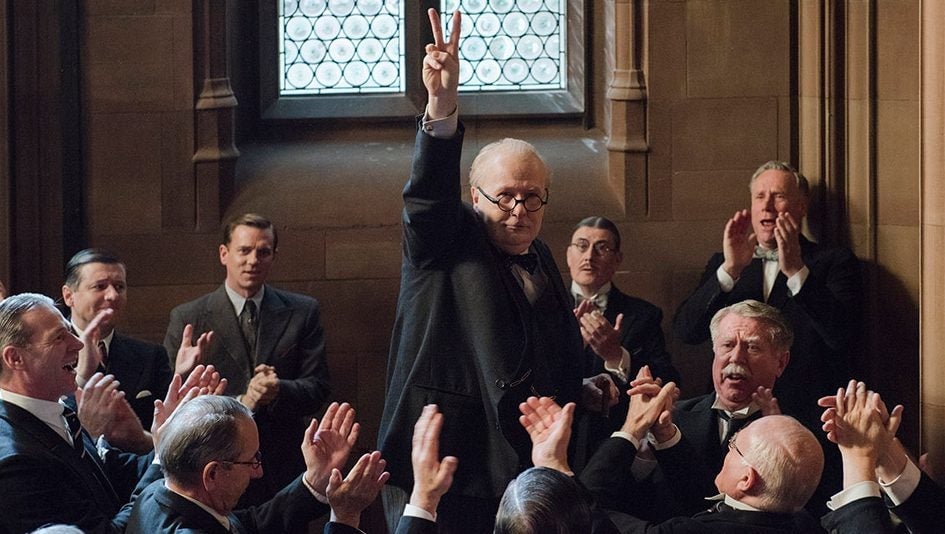“Darkest Hour” shows an erratic, obnoxious leader can still be great
Stop me if you’ve heard this one before: At a time of great peril, one of the world’s great powers was led by an obnoxious, unpredictable personality. This worried many of his contemporaries, who recognized that in this moment of extreme crisis, they needed strong and steady leadership.


Stop me if you’ve heard this one before: At a time of great peril, one of the world’s great powers was led by an obnoxious, unpredictable personality. This worried many of his contemporaries, who recognized that in this moment of extreme crisis, they needed strong and steady leadership.
This man, of course, was Winston Churchill, prime minister of the United Kingdom during World War II. The film Darkest Hour, out in theaters Nov. 22, centers on Churchill’s political struggles—both internal and external—during a chaotic one-month period in 1940 as Adolf Hitler’s German army was rapidly advancing toward British shores.
The difference between Churchill and the modern world leader you may be thinking of is that the British prime minister was redeemed by his persistent sense of self-doubt. Publicly, he brashly displayed total confidence in his convictions, but privately he wrestled with them, seeking the counsel of those who knew him best.
Directed by Joe Wright (Atonement, Anna Karenina), Darkest Hour is a rousing, kinetic wartime drama, sustained by Gary Oldman’s monumental performance as Churchill, which is certain to earn the actor major accolades in the months ahead. And intentionally or not, the film does end up playing as something of a rebuke of the current US president, a year after his election. The film’s Churchill is almost an alternate universe Donald Trump, similar in several ways but diametrically opposed in one key quality: self-awareness and introspection.
Darkest Hour makes obvious, from its opening moments, that Churchill is a deeply flawed man. Viewers are introduced to him on the eve of his ascendance to prime minister (the film’s stirring first scene shows parliament forcing Neville Chamberlain out of the position). He’s cooped up in bed, ordering various assistants around and verbally abusing his new personal secretary (Lily James, who’s fantastic in the role).
Churchill was only selected because he was the sole member of the Conservative Party who was palatable enough to the opposition to lead a wartime coalition government. Among his many stances that have aged extremely poorly throughout history were his hostility to Indian independence (he once called for Mahatma Gandhi to be tied up and crushed by an elephant), and his resistance to women’s suffrage.
Clearly, Churchill was an imperfect man. But historians have argued that his imperfections, ironically, may have made him the perfect person to resist Hitler and lead Britain through turmoil. Darkest Hour demonstrates in riveting detail how his own uncertainty is exactly what the country needed.

“Churchill made terrible mistakes as well as achieving great triumphs, but central to it all was a sense of doubt,” Wright told the Guardian in September. Central to Wright’s film is the question of appeasement: Churchill opposes negotiating with Hitler, while his foreign secretary, Lord Halifax (Stephen Dillane) badly wants to begin peace talks with Germany in the hopes of preventing an imminent invasion of the British Islands.
For about half the film, Churchill rejects the very idea of brokering a pact with the fascist German chancellor. “When will the lesson be learned?” he screams at Halifax from across the war room table. “You cannot reason with a tiger when your head is in its mouth!”
But as the Germans scorch through France and surround the entire British army at Dunkirk (yes, this film ties in quite nicely with Christopher Nolan’s Dunkirk), Churchill starts having doubts. Maybe peace talks are necessary to save the British people from total annihilation, he thinks. If the UK is destroyed, history will remember that it happened on his watch.
He consults regularly with King George VI (Ben Mendelsohn), who starts out skeptical of the new prime minister but soon warms to him, recognizing a thoughtful and perceptive man beneath the veneer of brazenness. He listens to his wife, Clementine, who in a single line describes the film’s thoughts on leadership: “You are wise because you have doubts,” she assures Winston.
The British people, however, can’t know that Churchill is quietly doubting his every move. He restlessly questions himself over whether or not to tell them the truth of the German “advance” into Western Europe, which, of course, is a swift and terrible invasion that will soon threaten Britain’s own borders. Tell them and risk pandemonium, or skirt the truth for the sake of the national morale?
Ultimately, as Darkest Hour depicts in gripping detail, Churchill determines to fight on. He squashes the attempt to reason with Hitler, wins the support of Parliament, and tells the British people that they will “defend to the death their native soil” from encroaching tyranny. This, he believes, might inspire the rest of the world to continue the fight after them.
Churchill in Darkest Hour is a volatile person, hushed and brooding one moment and manic the next. What saves his leadership is the fact that he understands the weight of his decisions.
As a blueprint for leadership in crisis, and how self-doubt must be the lynchpin of effective decision-making, Darkest Hour is a timely triumph. The US president placed a bust of Churchill in the White House when he took office. If he sees the film, he may see something of himself to relate to, and perhaps even learn from.